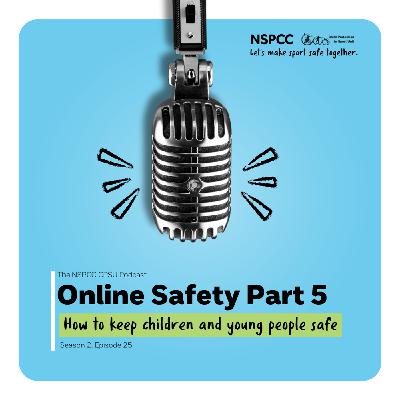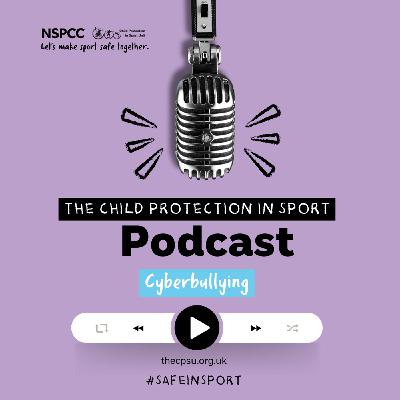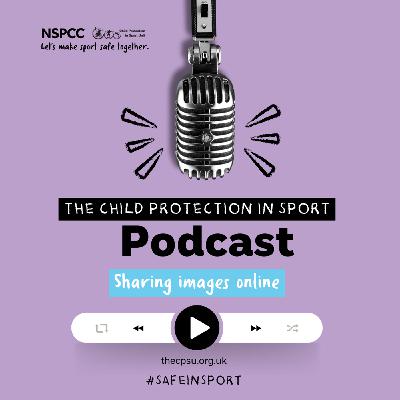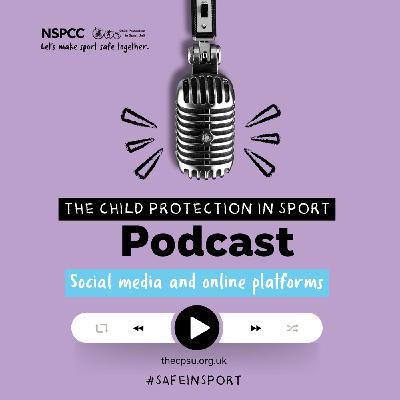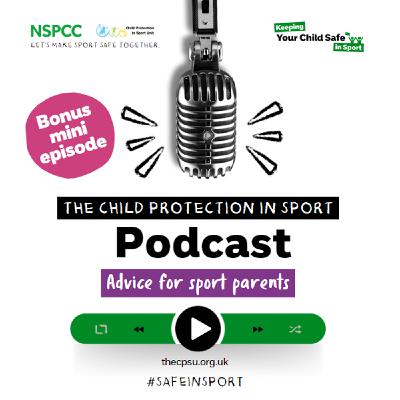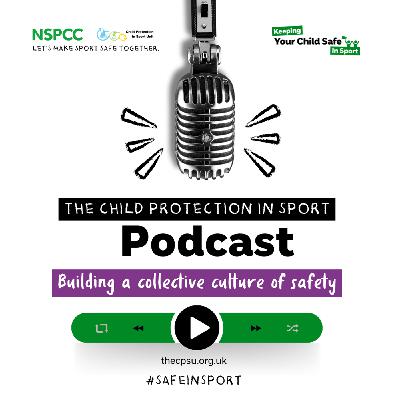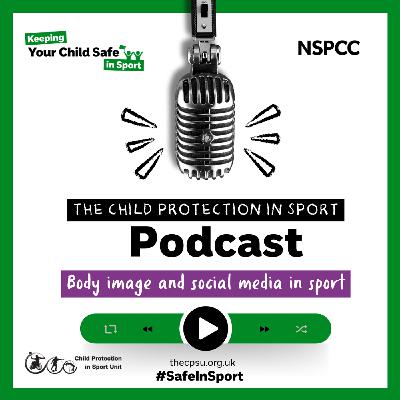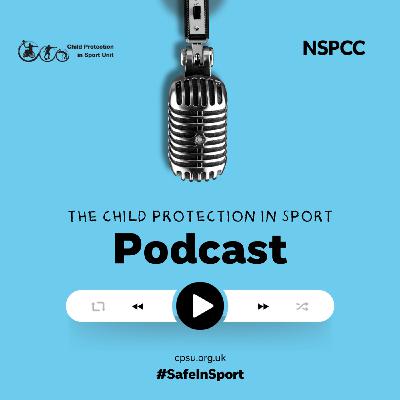Discover The NSPCC Child Protection in Sport Unit podcast
The NSPCC Child Protection in Sport Unit podcast

The NSPCC Child Protection in Sport Unit podcast
Author: The NSPCC Child Protection in Sport Unit podcast
Subscribed: 4Played: 17Subscribe
Share
© NSPCC
Description
Welcome to our NSPCC Child Protection In Sport podcast, your definitive guide to safeguarding in sport and creating a safer sporting environment for young people.
Join us as we delve into crucial discussions on athlete safety, abuse prevention and coaching best practices. Explore expert insights, policy development strategies and actionable steps to ensure you and your club create a secure and nurturing space for young athletes.
Tune in to empower yourself with the knowledge and tools necessary to safeguard children in sport and to shape a healthier and safer athletic community.
#SafeInSport
33 Episodes
Reverse
Moving from policies to people
Dive into our latest podcast where we explore the vital role of safeguarding in community sports and physical activities. The discussion features three guests: Anita Stewart, Sport Welfare Officer from Active Norfolk, John Downes, Designated Safeguard Lead from StreetGames, and Ross Podyma, Strategic Director from Sporting Communities. They share insights on the challenges and solutions in safeguarding within community sports.
Key points include:
volunteer confidence: emphasising the need for training and support to make sure volunteers are confident in safeguarding practices
community engagement: highlighting the importance of local partnerships and community involvement in creating safe environments
cultural shift: advocating for a shift from compliance-based safeguarding to a more integrated, welfare-focused approach that puts children first
youth involvement: stressing the importance of involving young people in decision-making and creating environments where they feel safe and valued
Featuring
Liza Ware – Host, NSPCC CPSU Senior Safeguarding Consultant
Anita Stewart – Sport Welfare Officer, Active Norfolk
John Downes – Designated Safeguarding Lead, StreetGames
Ross Podyma – Strategic Director, Sporting Communities
Anita Stewart: "I went into an organisation and did a forum with some young people from a disability group in Norfolk, and we were asking them what made them feel safe and what safeguarding meant to them. A young person said, 'when I think of safeguarding, I think of folders, risk assessments and bits of paper.' And then we asked them what makes them feel safe? She said 'people make me feel safe'. And from that we came up with 'Let's move safeguarding from policies to people'."
Louisa Street—youth worker, PhD candidate, and member of the HeadStart Kernow Digital Resilience Project—sits down with NSPCC CPSU Senior Digital Content Editor Sam to answer key questions about online safety in sport.
We cover:
how top athletes can promote themselves on social media without compromising safety
how sports clubs can use photos responsibly while keeping participants protected
how clubs can take a harm reduction approach to instant messaging apps
how to respond to online bullying disclosures
We also explore setting boundaries across digital platforms, informed consent, photo selection and the importance of working alongside parents and carers to create safe spaces for young athletes.
Most importantly, we highlight why listening to young people and putting them at the centre of decision-making is key to safeguarding in sport.
Tune in now and make online safety a priority in your club or organisation!
💬Featuring:
Samantha Lawrence – Host, NSPCC CPSU Senior Digital Content Editor
Louisa Street – Youth worker, a PhD candidate and a member of the HeadStart Kernow Digital Resilience Project in Cornwall
📄Transcript:
You can access the full transcript for this episode here
Listen to the full Online Safety series here.
📚More information
Online safety and social media - NSPCC CPSU resource page
Using digital platforms safely - NSPCC CPSU guidance on how to use digital platforms safely
Sample social media policy - A sample of a social media policy which clubs, organisations and activity providers can adapt
💻Make sure you visit the CPSU website for the latest information and guidance about safeguarding in sport.
In this episode, they explore how adults can support children and young people in reducing harm and building digital resilience in the online world.
Samantha and Louisa discuss:
why prohibition doesn’t work
the harm reduction principle and its application to online safety
concerns young people have about the online world
how adults can respond if a child or young person is worried about their online safety
💬Featuring:
Samantha Lawrence – Host, NSPCC CPSU Senior Digital Content Editor
Louisa Street – Youth Worker and PHD Candidate and member of the Headstart Kernow Digital Resilience Project in Cornwall.
📄 Transcript:
You can access the full transcript for this episode here
Listen to the full Online Safety series.
More information:
Online safety and social media - NSPCC CPSU resource page
Using digital platforms safely - NSPCC CPSU guidance on how to use digital platforms safely
Sample social media policy - A sample of a social media policy which clubs, organisations and activity providers can adapt
Make sure you visit the CPSU website for the latest information and guidance about safeguarding in sport.
Bullying has been raised as a big concern for children, particularly in the
online space, so it is vital that we understand how to handle it and what actions we need to take to keep children and young people safe.
You can't get away from social media in a sport and setting, but we should never forget our safeguards and responsibilities. As safeguarders, we must take time to carefully think through the different types of risks that children and young people may be exposed to in a virtual sport setting.
This podcast was originally recorded in May 2020 but has been repurposed for use in November 2024.
Joined by host Helen and NSPCC Safety Officer Laura, we take a look at:
examples of how to deal with cyberbullying in your club
why cyberbullying in sport may be different
what young people should consider before posting messages online
what young people should do if they receive abusive content
Always remember; if you're concerned or you're upset. Speak to someone that you know. Speak to a family member. Speak to somebody that you trust in a professional environment and seek that help.
Featuring:
Helen Westerman – Host, NSPCC
Liza Ware – NSPCC CPSU Senior Consultant
Laura Randall – NSPCC Online Safety Strategy Team
Transcript
Read the full transcript on the CPSU website.
Listen to our previous episodes:
Part 1 - Online Safety for the Sport and Activity Sector - Social Media and Online Platforms
Part 2 - Online Safety for the Sport and Activity Sector - Sharing Images Online
More information:
Online safety and social media - NSPCC CPSU resource page
Using digital platforms safely - NSPCC CPSU guidance on how to use digital platforms safely
Sample social media policy - A sample of a social media policy which clubs, organisations and activity providers can adapt
Make sure you visit the CPSU website for the latest information and guidance about safeguarding in sport.
In this episode we shift the focus to the topic of sharing of images online. It's fantastic that we have so much technology that allows children, young people, professionals and athletes to communicate. But it's crucial that we are making sure that everyone is secure and safe in how they do this.
We look into advice for clubs, organisations, activity providers and parents to help them talk with young people about sharing images and how to get young people to understand the consequences that can be a part of this.
This podcast was originally recorded in May 2020 but has been repurposed for use in November 2024.
Joined by Helen and Laura from the NSPCC Online Safety Team, our NSPCC CPSU Senior Consultant Liza Ware cover:
consequences of sharing indecent images online
challenges faced by professional young athletes on social media
sharing, tagging and promotion of children in sport by sports clubs
mixed aged chat groups and forums
💬 Featuring:
Helen Westerman – Host, NSPCC
Liza Ware – NSPCC CPSU Senior Consultant
Laura Randall – NSPCC Online Safety Strategy Team
📄 Transcript:
You can access the full transcript for this episode here
🎧 Listen to our previous episodes:
Part 1 - Online Safety for the Sport and Activity Sector - Social Media and Online Platforms
📚 More information:
Online safety and social media - NSPCC CPSU resource page
Using digital platforms safely - NSPCC CPSU guidance on how to use digital platforms safely
Sample social media policy - A sample of a social media policy which clubs, organisations and activity providers can adapt
💻Make sure you visit the CPSU website for the latest information and guidance about safeguarding in sport.
In this first podcast episode, Liza Ware, one of our NSPCC CPSU Senior Consultants, talks about how we can keep children and young people safe on social media and online platforms with fellow colleagues from the NSPCC online safety team.
With the increasing role of social media in daily life, it's important that clubs, organisations and activity providers understand what to look for in a social media app or platform as well as the policies that need to be in place to protect young people and children.
This podcast was originally recorded in May 2020 but has been repurposed for use in November 2024.
Liza and her guests discuss:
what should sport and physical activity organisations look for in a social media app or online platform?
the importance of social media policies
safer recruitment and restricted access to platforms
Featuring:
Helen Westerman – Host, NSPCC
Liza Ware – NSPCC CPSU Senior Consultant
Laura Randall – NSPCC Online Safety Strategy Team
Transcript
You can read the full transcript here
More information:
Online safety and social media - NSPCC CPSU resource page
Using digital platforms safely - NSPCC CPSU guidance on how to use digital platforms safely
Sample social media policy - A sample of a social media policy which clubs, organisations and activity providers can adapt
Go to guide - WhatsApp - The NSPCC CPSU go-to guide on how to use WhatsApp
Make sure you visit the CPSU website for the latest information and guidance about safeguarding in sport.
In this podcast, we discuss how you can make sure that your sports event stays safe for all children and young people by putting the right safeguarding policies and procedures in place.
We'll be talking to Michelle North, Head of CPSU and Senior Consultant, about the safeguarding needs for different sized sporting events, as well as what needs to be looked at pre, during and post sport event to help guarantee everyone involved has a safe and enjoyable experience.
how to start the safeguarding process at sport events
what to include in your events safeguarding policy
sport event planning, risk assessments, getting information together before the event
codes of conduct for sport events
permission slips
overnight stays
first aid
A sporting event can cover all kinds of games or matches; from a rounders match on the village green to the Olympics; it could involve 2 teams, it could be a multi-team event or it could be international. Safeguarding measures need to be in place regardless of the size of the event.
Listen to Part Two of our dive into the basics of DBS checks (if you missed Part One, take a listen here).
We asked our sport and activity audience to send in questions about DBS checks to Linda and Helen, in this episode we find out:
what levels of check are required?
do sport parents need to be DBS checked?
what is a referral?
how and when should sports refer?
how long does the DBS keep information?
Understanding the need for DBS checks is just part of safeguarding in sport, subscribe to our Podcast for the latest developments, information and guidance.
💬 Featuring:
Mel Addams and Lian Gaten – CPSU Information Officers
Linda and Helen – Disclosure and Barring Service
📄 Transcript:
You can access the full transcript for this episode here
📚More information
Disclosure and Barring Service (DBS) website - the DBS website
Safer recruitment - NSPCC CPSU guidance about safer recruitment
Case management tool - NSPCC CPSU's free tool which guides you through everything you need to know about case management, from small grassroots clubs to professional teams.
💻Make sure you visit the CPSU website for the latest information and guidance about safeguarding in sport
Safeguarding in sport is all about protecting young people, anyone undertaking a role that involves contact with or responsibility for children (or other vulnerable groups such as adults at risks) should be taken through a safer recruitment process, a DBS check being one of the key onboarding procedures.
We speak to Helen and Linda from the Disclosure and Barring Service about the different levels of check available, who's eligible and how checks are carried out as well as the importance of safer recruitment and how this helps safeguarding in sport.
Take a listen to find out the answers to these questions:
what is a DBS check?
how does a DBS check help protect young and vulnerable people
how do you get a DBS check done?
how long is the DBS process?
what makes someone eligible for different levels of DBS check?
💬 Featuring:
Mel Addams and Lian Gaten – CPSU Information Officers
Linda and Helen – Disclosure and Barring Service
📄 Transcript:
You can access the full transcript for this episode here
🎧 Listen to our previous episodes:
DBS Checks - Your Questions Answered
📚More information
Disclosure and Barring Service (DBS) website - the DBS website
Safer recruitment - NSPCC CPSU guidance about safer recruitment
Case management tool - NSPCC CPSU's free tool which guides you through everything you need to know about case management, from small grassroots clubs to professional teams.
💻Make sure you visit the CPSU website for the latest information and guidance about safeguarding in sport
In this podcast we explore the basics of what safeguarding actually means within the sport and activity world. Looking at what steps sports clubs and organisations need to take to ensure they're effectively safeguarding children and young people in the sector.
We look into:
why safeguarding in sport is so important
the different types of abuse in sport and how to spot them
how to create and implement a safeguarding policy
putting safeguarding measures in place
finding out what safeguarding training is right for you and your club
the risks of not doing anything
how to raise and deal with a safeguarding concern
Whether you've just started on your safeguarding journey, or are listening to this podcast as a refresher, we'll have you getting to grips with the basics of safeguarding in sport in no time.
💬 Featuring:
Mel Addams, Lian Gaten and Laura Young – CPSU Information Officers
Jude Toasland – CPSU Senior Consultant
📄 Transcript:
You can access the full transcript for this episode here
📚 More information:
Putting safeguards in place - NSPCC CPSU guidance page on how your club, organisation or activity provider should out safeguards in place
Mental health and wellbeing - NSPCC CPSU resource page about mental health and wellbeing in a sport and activity setting.
💻Make sure you visit the CPSU website for the latest information and guidance about safeguarding in sport.
Mel, our CPSU Information Officer, is joined by Jen and Lisa, two sports parents whose young athletes compete at a high level.
We'll be hearing about:
the reality of being a sport parent for higher performance young athletes
the competitive sport community
the importance of parental support in sport clubs and organisations
parent/coach trust
choosing the right club for your young athlete
parental behaviour at matches and how it's managed
💬Featuring:
Mel Addams – CPSU Safeguarding Information Officer
Jen and Lisa – Sports mums of 5 young people (ages 7 to 11) involved in competitive sports
📄 Transcript:
You can access the full transcript for this episode here
📚More information
Keeping your child safe in sport - The NSPCC CPSU yearly campaign focusing on how parents can help keep sport and physical activity safe.
Parents in sport – Our information page for coaches and clubs which sets out advice and guidance on how to deal with parents in sport
Information for parents The dedicated NSPCC CPSU Parents Hub designed specifically to help parents understand their role in sport and safeguarding
💻Make sure you visit the CPSU website for the latest information and guidance about safeguarding in sport
Join us as we have a chat with Helen and Ali, two passionate sport parents, about the very different roles they play in their children's sports, as well as Dr Camilla Knight, Sport Scientist at Swansea University and a bit of an expert when it comes to sport parents.
We'll be hearing about how sports parents:
support young athletes
build the coach/parent relationship
discuss what's expected from your child's sports club
highlight the responsibilities of a sport parent
choose a sports club for your budding young athlete
discuss sport safeguarding 101; who to report your concerns to
💬 Featuring:
Dr Camilla Knight – Sports Scientist at Swansea University
Mel Addams – CPSU Safeguarding Information Officer
Ali – Sport parent to a 7 year old who does disability swimming & trampoline and a 4 year old who does swimming
Helen - Sport parent to a 5 year old who does gymnastics, swimming & horse riding and a 2 year old who does toddler football and swimming
📄 Transcript:
You can access the full transcript for this episode here
📚More information
Keeping your child safe in sport - The NSPCC CPSU yearly campaign
Parents in sport – NSPCC CPSU guidance for sports clubs and coaches
Information for parents - The NSPCC CPSU resource dedicated to parents
💻Make sure you visit the CPSU website for the latest information and guidance about safeguarding in sport
Catch up with Connor, a member of the NSPCC Young People's Board for Change (YPBC) as he talks with Michelle North, Head of the CPSU during Keeping Your Child Safe in Sport Week.
They discuss what parents should look for when finding the right sports club or activity programme for their child, as well as inclusion, resilience and finding the right balance in a young person's life.
This podcast was recorded for the NSPCC CPSU's Keeping Your Child Safe in Sport Week, which is taking place 07-11 October 2024.
In this episode, Connor from the NSPCC Young Person's Board for Change interviews our safeguarding panel about how to build a collective culture of safety within sport, throwing out some challenging and thought-provoking questions such as:
what does sport mean to them, who has influenced their sporting journeys and who made them feel safe?
what does a safe sporting environment look like?
how do they balance competition and young people's wellbeing?
who has inspired them to take care of themselves on and off the court?
what are the key challenges in safeguarding and how can we address them?
what improvements would they like to see in the world of youth sport?
In this insightful discussion, the panel tackle a broad spectrum of safeguarding topics, from the importance of a supportive coaches and having fun to involving young people in the shaping of clubs, parents and carers and safeguarding volunteers.
They also touch on mental health, The FA's Play Safe campaign, the CPSU case data research and the importance of strengthening unregulated and unaffiliated sport and physical activity.
💬Featuring:
Connor – Host, NSPCC YPBC
Rachel Tarr - Child Protection Manager from The Football Association (The FA)
Michelle North - Head of the NSPCC Child Protection in Sport Unit (CPSU)
Maisie - NSPCC YPBC
📄Transcript
You can download the full transcript from the CPSU website.
Further information
Getting started with safeguarding in sport and physical activity
Parent Hub
Involving children and young people
📚Related resources
CPSU Case data research project - The NSPCC CPSU summery of the latest case data research
Play Their Way - A great coaching initiative that advocates a child-first approach to coaching
NSPCC Young People's Board for Change
💻Make sure you visit the CPSU website for the latest information and guidance about safeguarding in sport
As part of #SaferInternetDay and the ever growing notoriety of having an online presence from such a young age, we look at the impact social media has on body image for young athletes.
We're joined by British Swimming's National Talent and Events Welfare Officer Rebecca Wood to cover how social media can be a double edged sword for growing athletes, as well as how body image has brought about changes within the British Swimming safeguarding policies.
During this episode we cover:
the positives of social media in building an athletes brand
the affects of sharing images and obligation to sport
the pressure of the 'ideaolised' body and the demand to look a certain way
experiences of online trolling
policy changes thanks to social media
how communication and treating an athlete as an individual is paramount
Don't miss out on the conversation that goes beyond the game, revealing how social media can shape an athlete both on and off the field and what clubs, organisations and teams can do to help navigate the digital sport universe.
💬Featuring:
Mel Nienartowicz – Host, CPSU
Carole Billington-Wood – Senior Consultant, CPSU
Rebecca Wood– National Talent and Events Welfare Officer, British Swimming
📄 Transcript:
You can access the full transcript for this episode here
📚 More resources:
Online Safety Training Scenarios - A collection of videos showcasing different scenarios safeguarders may encounter and how to handle them
CPSU Podcast - Weight-making sports and activities - part of our podcast series on body image, weight management and disordered eating in sport
Online safety and social media in sport - CPSU guidance for online safety and social media in sport
Responding to Online Abuse - NSPCC guidance
Safeguarding Online Sporting Spaces - Loughborough University
💻Make sure you visit the CPSU website for the latest information and guidance about safeguarding in sport
The extension to the positions of trust legislation comes after the NSPCC’s ‘Close the Loophole’ campaign. In this podcast we analyse who is included in the extension to the law and what this means for your organisation.
In this episode, we talk about:
what is the new leglislation and what does it mean for sport organisations?
why did the law need to be extended?
'Close the Loophole'
what changes should be implemented to safeguard children and young people in sport
the importance of reviewing and updating sport organisation and club safeguarding policies
how to update your safeguarding policies
--
🛑Please note:
This content may be sensitive to some individuals, it may bring up distressing memories, thoughts or feelings. If you need further support or know someone who might need support you can find links to organisations that can provide emotional support below.
--
💬Featuring
Becky Groarke – Information Officer, CPSU
Jude Toasland – Senior Consultant, CPSU
Cate Meredith – Senior Consultant, NSPCC consultancy team
Shirley McGinley – Senior Consultant, NSPCC consultancy team
Fiona Becker – Senior Consultant, NSPCC consultancy team
📄Transcript
You can view the transcript of this podcast here and access links to further information on this topic.
🤝Helplines and support
NSPCC Helpline
tel: 0808 800 5000
email: help@nspcc.org.uk – helping adults to protect children
Childline tel: 0800 1111 – for children and young people aged 18 and under
HAVOCA – Help for Adult Victims of Child Abuse
NAPAC – The National Association for People Abused in Childhood
One in Four – support in Ireland for adults who experienced childhood sexual abuse
Rape Crisis – support in England and Wales
Rape Crisis Help – support in Ireland
Stop It Now! Helpline tel: 0808 1000 900 – UK and Ireland
Survivors UK – support for men
The Samaritans tel: 116 123 - a safe place to talk any time you like
📚More resources
Abuse in positions of trust – CPSU guidance
Positions of trust - FAQs about the changes – CPSU guidance
Deal with a concern – CPSU guidance
Protecting children in sport from grooming and sexual abuse – CPSU resource
Safeguarding reporting procedures - CPSU flowcharts
Sample codes of conduct – CPSU sample
Sample safeguarding policy statement – CPSU sample
Understanding sexual offending and the grooming process – CPSU webinar
Report into child sexual abuse in sport – Truth Project Thematic Report
💻Make sure you visit the CPSU website for the latest information and guidance about safeguarding in sport
We focus on the importance of prioritising safeguarding at all levels, ensuring that club and organisations safeguarding policies are communicated to everyone as well as the importance of creating a culture of safety where children's voices are heard.
Paul also emphasises to need for robust safeguarding policies and procedures in sport and activity to ensure all children and young people have a safe and fun experience.
In this episode of the CPSU podcast, we cover:
the wider impact of abuse
what sports clubs can do to help build a safe environment
the importance of safeguarding policies and procedures
listening to young athletes and children
how people with lived experience should be more involved with organisations and helping create safeguarding policies
knowing who to report a concern to
--
🛑Please note:
During this podcast we talk about childhood sexual abuse. This may be difficult to hear and, for some people, it may bring up distressing memories, thoughts or feelings.
Whilst it may not be easy to listen to, this episode includes important information to help all of us keep children safe in sport.
To look after yourself while you listen consider taking breaks, listening during a walk or before an activity you enjoy such as exercise or meeting a friend.
--
💬Featuring
Paul Stephenson – CPSU Senior Consultant
Paul Stewart – former professional footballer
Paul Stewart is a former Premiership and International footballer who played for some of the biggest clubs in English Football, including Manchester City, Tottenham Hotspurs and Liverpool.
Paul has lived experience of childhood sexual abuse by his football coach. Paul’s story was featured in BBC1’s “Football's Darkest Secret”, where he discussed openly and honestly about the impact abuse has had on his life.
Since speaking about his experience, Paul now works to create safer spaces and cultures within sport for all children, young people, adults at risk and athletes. Paul works for the English Football League and Premier League to education and raise awareness with academy players, staff and volunteers
📄 Transcript:
Check out the transcript of this podcast and links to further information on this topic.
🤝Helplines and support
NSPCC Helpline
tel: 0808 800 5000
email: help@nspcc.org.uk – helping adults to protect children
Childline tel: 0800 1111 – for children and young people aged 18 and under
HAVOCA – Help for Adult Victims of Child Abuse
NAPAC – The National Association for People Abused in Childhood
One in Four – support in Ireland for adults who experienced childhood sexual abuse
Rape Crisis – support in England and Wales
Rape Crisis Help – support in Ireland
Stop It Now! Helpline tel: 0808 1000 900 – UK and Ireland
Survivors UK – support for men
The Samaritans tel: 116 123 - a safe place to talk any time you like
📚More resources:
Engaging people with lived experience of childhood sexual abuse in sport – Our NSPCC CPSU resource to help understand and communicate with individuals who have lived experience
Protecting children in sport from grooming and sexual abuse – A NSPCC CPSU resource
Sample safeguarding policy statement – Our NSPCC CPSU sample policy statement for clubs and organisations to utilise
Understanding sexual offending and the grooming process – A NSPCC CPSU recorded webinar
Report into child sexual abuse in sport – Truth Project Thematic Report
💻Make sure you visit the CPSU website for the latest information and guidance about safeguarding in sport
Join us for this compelling discussion on reshaping narratives and promoting holistic approaches to support athletes in their journey towards a balanced and positive relationship with food and body image.
Our final episode of this series talks about:
how to promote healthy weight and eating practices in sport
normalising conversations about healthy weight and nutrition
getting a positive message across to parents about nutrition and wellbeing
considering the type of language used within your sport club and organisation around food and body image
how to embed safe practice around weight monitoring
the importance of supportive relationships
--
🛑Please note:
This content may be sensitive to some individuals, it may bring up distressing memories, thoughts or feelings. If you need further support or know someone who might need support you can find links to organisations that can provide emotional support below.
--
💬Featuring
Carole Billington-Wood – CPSU Senior Consultant
Dr Carolyn Plateau - Senior Lecturer in Psychology, Loughborough University
The CPSU would like to thank Dr Carolyn Plateau, Senior Lecturer in Psychology at Loughborough University and former 800 metre international athlete. for being part of this journey into body image, weight and eating disorders in sport.
📄Transcript
You can view the transcript of this podcast here and access links to further information on this topic.
🤝Helplines and support:
NSPCC Helpline
tel: 0808 800 5000
email: help@nspcc.org.uk – helping adults to protect children
Childline tel: 0800 1111 – for children and young people aged 18 and under
Beat Helpline: 0808 801 0677
Beat Studentline: 0808 801 0811
Beat Youthline: 0808 801 0711
📚More resources:
Eating disorders and disordered eating in sport - CPSU webinar
Balancing training with looking after your body - our online resource about how to look after a young person's psychical health
Supporting young athletes mental health and wellbeing - how sports can help safeguard young athletes' mental health and wellbeing
💻Make sure you visit the CPSU website for the latest information and guidance about safeguarding in sport
Embark on a crucial exploration of weight-making sports in this podcast, where expert insights from Dr Carolyn Plateau, senior lecturer in psychology at Loughborough University, shed light on the challenges faced by young athletes.
Discover strategies to safeguard young athletes wellbeing within the realms of weigh-focused sports as we look at the delicate balance between athletic performance and the importance of nurturing a healthy relationship with body image and nutrition.
In this episode, Carole and Carolyn talk about:
what is a weight-making sport?
the challenges high performance athletes face in weight-making sports
the culture of weight-making sports and extreme solutions
who is responsible for supporting athletes and what safeguarding support should be put in place?
how to ensure an athletes well-being is prioritised
safeguarding considerations to think about
--
🛑Please note:
This content may be sensitive to some individuals, it may bring up distressing memories, thoughts or feelings. If you need further support or know someone who might need support you can find links to organisations that can provide emotional support below.
--
💬Featuring
Carole Billington-Wood – CPSU Senior Consultant
Dr Carolyn Plateau - Senior Lecturer in Psychology, Loughborough University
The CPSU would like to thank Dr Carolyn Plateau, Senior Lecturer in Psychology at Loughborough University and former 800 metre international athlete. for being part of this journey into body image, weight and eating disorders in sport.
📄Transcript
You can view the transcript of this podcast here and access links to further information on this topic.
🤝Helplines and support:
NSPCC Helpline
tel: 0808 800 5000
email: help@nspcc.org.uk – helping adults to protect children
Childline tel: 0800 1111 – for children and young people aged 18 and under
Beat Helpline: 0808 801 0677
Beat Studentline: 0808 801 0811
Beat Youthline: 0808 801 0711
📚More resources:
Eating disorders and disordered eating in sport - CPSU webinar
Balancing training with looking after your body - our online resource about how to look after a young person's psychical health
Supporting young athletes mental health and wellbeing - how sports can help safeguard young athletes' mental health and wellbeing
💻Make sure you visit the CPSU website for the latest information and guidance about safeguarding in sport
Welcome to part 3 of our mini series talking about body image, weight management and disordered eating in sport. Once again, we're joined by by Dr Carolyn Plateau, Senior Lecturer in Psychology at Loughborough University and former 800 metre international athlete who gives us her professional insights and guidance on this hard-hitting topic.
This episode covers:
why people monitor weight in a sports setting?
when is it right to monitor weight in a sports setting?
negative comparasion
how to undertake weight monitoring safely
guidance for weight monitoring in a sport setting
It's important to understand that weight monitoring is a part of certain sports; however, this needs to be done correctly, sympathetically and within safeguarding standards.
--
🛑Please note:
This content may be sensitive to some individuals, it may bring up distressing memories, thoughts or feelings. If you need further support or know someone who might need support you can find links to organisations that can provide emotional support below.
--
💬Featuring
Carole Billington-Wood – CPSU Senior Consultant
Dr Carolyn Plateau - Senior Lecturer in Psychology, Loughborough University
The NSPCC CPSU would like to thank Dr Carolyn Plateau, Senior Lecturer in Psychology at Loughborough University and former 800 metre international athlete. for being part of this journey into body image, weight and eating disorders in sport.
📄Transcript
You can view the transcript of this podcast here and access links to further information on this topic.
🤝Helplines and support:
NSPCC Helpline
tel: 0808 800 5000
email: help@nspcc.org.uk – helping adults to protect children
Childline tel: 0800 1111 – for children and young people aged 18 and under
Beat Helpline: 0808 801 0677
Beat Studentline: 0808 801 0811
Beat Youthline: 0808 801 0711
📚More resources:
Eating disorders and disordered eating in sport - CPSU webinar
Balancing training with looking after your body - our online resource about how to look after a young person's psychical health
Supporting young athletes mental health and wellbeing - how sports can help safeguard young athletes' mental health and wellbeing
💻Make sure you visit the CPSU website for the latest information and guidance about safeguarding in sport



